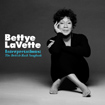
Betty LaVette: Interpretations: The British Rock Songbook (Anti)
Uh-oh: concept album. Could the wonderful Indian Summer of Ms. LaVette finally be winding down? Before even listening, two obvious, opposed answers suggest themselves. On the one hand, how could she sound bad singing anything with that voice? She's got a jagged but full-bodied rasp that makes Marianne Faithfull sound mellifluous in comparison, and she wields it with all the hard-won experience of the five-decade soul veteran that she is. Every lyric she sings is immediately granted greater emotional power through the magic of her sound. On the other hand, she's daring to tackle extremely well-known songs by some of the most revered figures in rock history: The Beatles (as a group, plus Paul, George, and Ringo solo songs), Animals, Led Zeppelin, Pink Floyd, Rolling Stones, Moody Blues, Elton John, the Who, Traffic, and Derek & the Dominos.
Sure, the material's great, and with a certain level of taste applied to interpretations, lots of artists can pull off such covers without embarrassing themselves, but rarely are the originals surpassed, made to sound fresh or different; in other words, endowed with any greater meaning that justifies the cover beyond a certain level of fun, or a comforting familiarity (and, usually, similarity). Doing a whole album of such songs is either incredibly complacent or amazingly audacious. In this case, audacious and successful. Well, there's one misstep: "Maybe I'm Amazed" doesn't worked slowed down and schmaltzed up. It's vastly outnumbered by the triumphs, notably a funky, horn-driven "Why Does Love Got to Be So Sad," the aching cry of "No Time to Live," and a supremely empathetic "Salt of the Earth" that ditches the snideness of the original. There's more to it than just her voice. She shows no fear in rewriting lyrics and rearranging structures to suit her interpretations and strengths.
These may be practically sacred texts to rockers, but she comes to them without preconceptions and treats them accordingly, and while she does sometimes actually shift the songs' meanings, in the process they emerge as more sincere and more boundary-crossing. She really knows how to build a program, too. Although halfway through I found myself feeling that a certain stylistic sameness put the album in danger of slipping into diminishing returns as the sound wore thin, right after that things kick into a higher emotional gear, climaxing as she closes the studio portion of the set by finding depths in "Don't Let the Sun Go Down on Me" that I doubt even Bernie Taupin knew were there, and then tops that with a concert bonus track where she improbably but inspirationally turns "Love Reign o'er Me" into a smoldering soul ballad that also yearns deeply for universal love.
